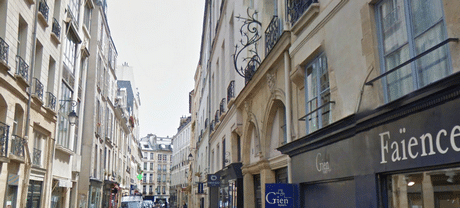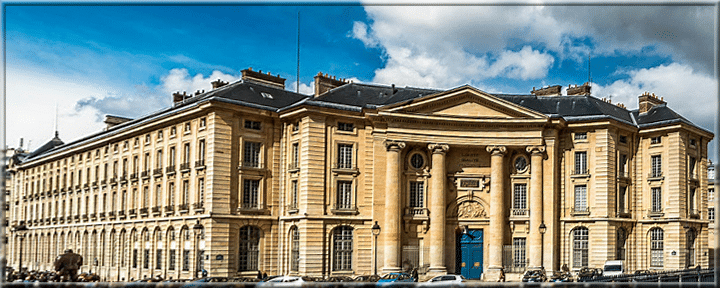
History of creation
and of the activities of the S.E.C
Create in 1950 by the philosopher Umberto Campagnolo, the S.E.C has as an aim, by affirming the need for a food-growing policy, to consolidate the values of civilisation, to work with the intercultural dialogue, the practice of the tolerance and the peacekeeping.
The S.E.C engaged in this direction for all the period of “cold war” where the relations between intellectuals and artists of the East and the West was so difficult. As regards France of large intellectuals of the time such as Jean Lacroix, Paul Ricœur, François Perroux, André Gide, Jean Paul Sartre took part in the activities of the S.E.C.
The official language of the S.E.C is French, his seat international is in Venice. Its Executive council meets once a year and his General Assembly every two years. The topic of the last Parliament which took place itself in Innsbruck in 2009 was “the crises of our present and the ethical reference”.

JACOB street – PARIS (6th arr.)

Preparation of the meeting with an advisor of Frédéric Mitterrand
1. Very short history of the creation and the activities of the S.E.C
Create in 1950 by the philosopher Umberto Campagnolo, the S.E.C has as an aim, by affirming the need for a food-growing policy, to consolidate the values of civilisation, to work with the intercultural dialogue, the practice of the tolerance and the peacekeeping. The S.E.C engaged in this direction for all the period of “cold war” where the relations between intellectuals and artists of the East and the West was so difficult. As regards France of large intellectuals of the time such as Jean Lacroix, Paul Ricœur, François Perroux, André Gide, Jean Paul Sartre took part in the activities of the S.E.C.
The official language of the S.E.C is French, his seat international is in Venice. Its Executive council meets once a year and his General Assembly every two years. The topic of the last Parliament which took place itself in Innsbruck in 2009 was “the crises of our present and the ethical reference”. The edition of a new series re-examined “To understand” directed a few years ago by Sergio Bobbio has just been undertaken. Finally Summer school devoted to the food-growing policy and European integration has been proposed for two years in Venice with about twenty students.
2. The French Center of the S.E.C
The French Center of the S.E.C was chaired by key figures such as Maurice Schuman and Henri Bartoli deceased here two years.
It organizes every approximately six weeks a conference on a subject given in the room of the Council of Paris I Sorbonne.

Thus recently intervened in front of us :
“To create in created” by Mr. Philipe Robert architect
The ethics of the Companies by Mr. Lamoureux Dr. at THALES
The sick hospital of profitability by Mr. Grimaldi.
Artistic creation is indissociable cultural debate. The intellectuals and the artists of all disciplines have the duty to sensitize the political officials and the public opinion on the need for developing “a food-growing policy” according to the terms of Umberto Campagnolo founder of the SEC or according to the term of Edgard Morin member of the S.E.C of a “policy of civilisation”, creative of values. Indeed the international, national or regional political authorities cannot cause true debates without the mediation of associations of intellectuals concerned with the problems of culture.
Unfortunately that it is the international S.E.C in Venice or the National centres, we know serious financial problems. To exist or remain we need gifts or subsidies of operation, what to pay a secretariat, to feed a website, an Internet network to organize conferences or to support a review. To be limited in its amount, such a support proves essential to the survival of associations like ours and that of a plural thought.
The European Company of culture, international association creates here 60 years, which can be made proud of a long experience of the intercultural dialogue, is the example even of this kind of association rare and threatened of disappearance for lack of a minimum of financial aid.
Contrary to the theatres, orchestras, museums and other cultural institutions, an organization of reflection is indeed deprived of receipts except for the contributions, often insufficient, of the gifts or the national subsidies prone one day or the other to the policy changes and the budgetary restrictions. It finds in addition hardly of patron devoted to an activity of the spirit of which the “visibility” is very restricted, by nature.
The Ministry for the Culture and the Communication which has just signed a new convention of patronage could can be to recommend our association. In the same way the Ministry could can be to integrate us in a program which would be appropriate for our competences. In short it is on the services of your Ministry that we count for initially recognizing our association and to help it to continue to affirm its vocation of representing language and French thought just like of actor of European cultural integration.

The European Company of Culture
The European Company of Culture has for origin the idea, put forward by the Italian philosopher Umberto Campagnolo the shortly after the Second World War, of a stable organization calling the men of culture, whatever their discipline and whatever their membership, with an awakening interdependent and the exercise of their responsibility, whereas the crisis of Europe and the disorder of the civilisation made absolutely necessary that they tie dialogue and together engage for research of a beneficial exit to the world-wide crisis.
Over the years, the European Company of Culture did not cease carrying out the analysis of the dominant trends of the news, beyond criticisms and of the easy and sterile denunciations, and seeking ways favorable to the advent of a civilisation of the values, not antagonistic with the ordinary policy – that of the established order – but in catch on it in order to give him direction and to found it.
Very early, the men of French culture answered the call which was sent to them. André Breton, Marc Chagall, Louis Jouvet, François Mauriac, took part in the Committee promoter. In turn, François Bédarida, François Mauriac, Alfred Kastler, Maurice Schumann, Henri Bartoli assumed the presidency of the French Center. The current president is Dominique Leroy.

Who are we ? | Project card-indexes | Homage to Henri Bartoli | Home
